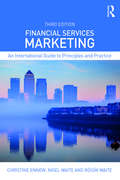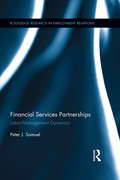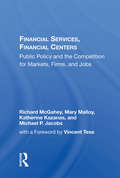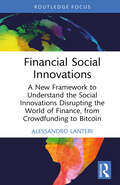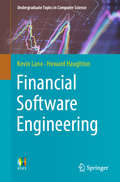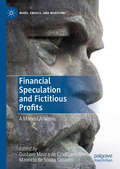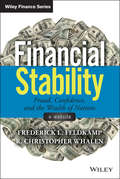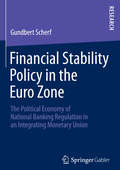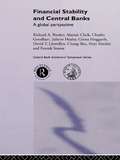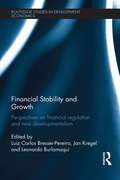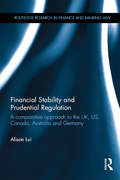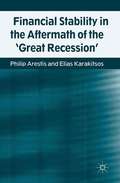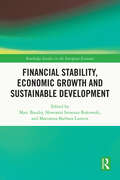- Table View
- List View
Financial Services Marketing: A Guide to Principles and Practice
by Christine Ennew Nigel Waite Róisín WaiteThis fourth edition of Financial Services Marketing firmly reinforces the book’s role as a leading global educational resource, combining appropriate conceptual principles with practical insights on how financial products and services are marketed in the real world. The authors draw upon their extensive international experience marketing some of the world’s best known financial brands including Lloyds TSB and Barclays. Readers will gain a firm understanding of how financial products and services work within the commercial, social, economic, governmental, regulatory and environmental context in which they operate.This fully updated and revised edition features: A brand-new chapter devoted to environmental, social and corporate governance Revised coverage of the impact of digital advances in all aspects of business models and marketing practice, including how artificial intelligence (AI) and social marketing are changing financial services and customer experience The latest regulatory developments for safeguarding the fair treatment of customers New and improved case studies that showcase best practice from around the world Upgraded Support Material including new teaching aids and references Financial Services Marketing is essential reading for advanced undergraduate and postgraduate students studying Marketing for Financial Services, Marketing Strategy and Consumer Ethics in Finance. It is also suitable for executive students studying for professional qualifications and executive MBAs.
Financial Services Marketing: An International Guide to Principles and Practice
by Christine Ennew Nigel Waite Roisin WaiteThis new edition balances the theoretical and the practical for advanced undergraduates, those specialising in financial services at postgraduate level, individuals undertaking professional courses such as those offered by the IFS School of Finance, and employees working within the financial services sector. Ennew & Waite draw from global business cases in both B2B and B2C marketing, taking a unique approach in terms of structure by splitting discussion between marketing for acquisition and marketing for retention. This fully updated and revised second edition features: A revised approach to the industry in the light of the global financial crisis, including ethical considerations, consumer confidence issues, and new approaches to regulation New sections on e-commerce and its impact on customer relationships New case studies and vignettes A new companion website to support teaching, including PowerPoint slides, test bank questions, additional cases and cameo video mini-lectures. Financial Services Marketing 2e will help the student and the practitioner to develop a firm grounding in the fundamentals of financial services strategy, customer acquisition and customer development. Reflecting the realities of financial services marketing in an increasingly complex sector, it provides the most up-to-date, international and practical guide to the subject available.
Financial Services Marketing: An International Guide to Principles and Practice (Marketing Ser.)
by Christine Ennew Nigel Waite Roisin WaiteNow in its 3rd edition, Financial Services Marketing offers a balanced and useful guide to the topic that is both conceptual and practical. The authors have drawn from extensive international experience to ensure that this text will resonate with users across the globe. This edition is complemented by numerous international references, examples and case studies featuring companies such as American Express, Direct Line, Barclays, NatWest RBS, Aviva and HSBC. This fully updated and revised edition features: An expanded section on regulation which has international reach and addresses the post-Brexit world Greatly expanded coverage of digital marketing at both the strategic and tactical levels New material on how to improve a company’s trustworthiness and safeguard a culture that is customer-focussed New examples, vignettes and case studies that showcase best practice from around the world B2B and B2C marketing Upgraded PowerPoint support on the companion website Financial Services Marketing 3e will be hugely beneficial to academic students of marketing and finance, as well as essential reading to those industry-based and studying for professional qualifications.
Financial Services Partnerships: Labor-Management Dynamics (Routledge Research in Employment Relations)
by Peter SamuelThe purpose of this book is to evaluate the debate on partnership, using original research data. Samuel provides a novel categorisation with which to synthesise and clarify a highly diverse literature on labour-management partnership, thus helping to refine the contemporary partnership debate. Secondly, he clarifies the circumstances under which ‘effective’ labour-management partnership is possible, while simultaneously elaborating why the achievement of ‘mutual gains’ is highly improbable in a liberal-market context. Thirdly, the book presents an integrated analysis of the interplay between macro-, meso- (industry) and micro-level factors. Fourthly, the research design enables the study to go beyond the case studies to make defendable empirical generalizations at the level of the industry. Finally, it advances a theoretical explanation of labour-management partnerships in ‘liberal market’ economies by bridging two opposing neo-institutional positions in the social sciences.
Financial Services and Preferential Trade Agreements: Lessons from Latin America
by Constantinos Stephanou Mona HaddadThis book fills a large gap in the literature on trade in services. It focuses on the dynamics of trade and investment liberalization in a sector of considerable technical and regulatory complexity-financial services. This volume chronicles the recent experiences of governments in Latin America that have successfully completed financial services negotiations through preferential trade agreements. One of the unique features of this book is the three in-depth country case studies-Chile, Colombia, and Costa Rica-all written by trade experts who led the negotiations of their respective countries in financial services. The authors offer analytical insights into the substantive content of the legal provisions governing financial market opening and the way such provisions have evolved over time and across negotiating settings. The studies describe how each of the three governments organized the conduct of negotiations in the sector, the extent of preparatory work undertaken before and during negotiations, and the negotiating road maps that were put in place to guide negotiators. Additional chapters complement the case studies by examining the evolving architecture of trade and investment disciplines in financial services and how best to prepare for negotiations in this sector. 'Financial Services and Preferential Trade Agreements' aims to provide practical lessons for policy makers, trade experts, and negotiators in developing countries who are involved in negotiating trade in financial services in the context of regional trade agreements. Academics and development practitioners interested in trade negotiations will also find the information valuable.
Financial Services at Falabella (A)
by C. Fritz Foley Agustin M. HurtadoIn 2010, the board and senior management team of Falabella, a leading retailer with operations throughout Latin America, faced choices about what to do with its financial services division. More than 4.5 million customers had CMR credit cards that could be used in Falabella stores, and Banco Falabella competed with other banks by offering personal banking services. The case covers many of the key questions the leaders of the firm faced, including whether to allow credit card holders to use their cards for purchases outside of Falabella stores, whether to develop personal banking services further, and whether to make substantial changes to the strategy or to exit the business. <p><p> The case gives students the opportunity to devise a strategy for the division of a retailer that provides customers with credit.
Financial Services in Nigeria: The Path Towards Financial Inclusion, Economic Development and Sustainable Growth (Sustainable Development Goals Series)
by Emmanuel Mogaji Taiwo O. SoetanThis book presents a holistic picture of Nigeria's financial services landscape. This includes identifying service providers and regulatory bodies, understanding consumer behaviour, and examining the unique challenges faced by Nigerian financial institutions. The book presents up-to-date research on recent developments and regulatory changes within Nigeria’s financial sector, as well as future considerations for how financial services and financial inclusion can play a crucial role in the country’s sustainable economic growth. Combining academic analysis with practical insights, the book takes readers through Nigeria’s key financial services providers, regulators, consumers, marketing strategies and challenges. A core focus throughout is on financial inclusion and the opportunities associated with reaching financially underserved or excluded populations, demonstrating how increasing financial access at a country-wide level aligns with global goals of reducing inequalities and promoting growth. It will have interdisciplinary appeal to scholars, students and professionals working in finance, economics, business, public policy and development studies.
Financial Services in the Twenty-First Century
by John J A BurkeThis textbook covers financial systems and services, particularly focusing on present systems and future developments. Broken into three parts, Part One establishes the public institutional framework in which financial services are conducted, defines financial service systems, critically examines the link between finance, wealth and income inequality, and economic growth, challenges conventional paradigms about the raison d’être of financial institutions and markets, and considers the loss of US financial hegemony to emerging regional entities [BRICS]. Part Two focuses on financial innovation by explaining the impact of the following technologies: cryptography, FinTech, distributed ledger technology, and artificial intelligence. Part Three assesses to what extent financial innovation has disrupted legacy banking and the delivery of financial services, identifies the main obstacles to reconstructing the whole financial system based upon “first principles thinking”: <P><P> Nation State regulation and incumbent interests of multi-national companies, and provides a cursory description of how the pandemic of COVID-19 may establish a “new normal” for the financial services industry. Combining rigorous detail alongside exercises and PowerPoint slides for each chapter, this textbook helps finance students understand the wide breadth of financial systems and speculates the forthcoming developments in the industry.
Financial Services in the Twenty-First Century: The Present System and Future Developments in Fintech and Financial Innovation
by John JA BurkeThis textbook covers financial systems and services, particularly focusing on present systems and future developments. Broken into three parts, Part One establishes the public institutional framework in which financial services are conducted, defines financial service systems, critically examines the link between finance, wealth and income inequality, and economic growth, challenges conventional paradigms about the raison d’être of financial institutions and markets, and considers the loss of US financial hegemony to emerging regional entities [BRICS]. Part Two focuses on financial innovation by explaining the impact of the following technologies: cryptography, FinTech, distributed ledger technology, and artificial intelligence. Part Three assesses to what extent financial innovation has disrupted legacy banking and the delivery of financial services, identifies the main obstacles to reconstructing the whole financial system based upon “first principles thinking”: Nation State regulation and incumbent interests of multi-national companies, and provides a cursory description of how the pandemic of COVID-19 may establish a “new normal” for the financial services industry. Combining rigorous detail alongside exercises and PowerPoint slides for each chapter, this textbook helps finance students understand the wide breadth of financial systems and speculates the forthcoming developments in the industry. A website to serve as a companion to the textbook is available here: www.johnjaburke.com.
Financial Services, Financial Centers: Public Policy And The Competition For Markets, Firms, And Jobs
by Richard McGaheyThis book lays out the forces that necessitate a strategy, shows how the competitive forces are affecting different financial centers and provides a policy framework for strategy development. It is essential for public officials, policy makers, legislators, scholars, and people in business.
Financial Shocks and TFP Growth
by Marcello Estevão Tiago SeveroA report from the International Monetary Fund.
Financial Simulation Modeling in Excel
by Keith Allman Josh Laurito Michael Loh"I've worked with simulation in business for over 20 years, and Allman really nails it with this book. I admit that I own his previous book on structured finance cash flows, but I was surprised by what I found in here. He addresses the fundamental questions of how decision makers react to simulations and his read was very much in accordance with what I've experienced myself. When it came to the nuts and bolts of describing the different types of simulation analysis the book becomes incredibly detailed. There is working code and models for a fantastic array of the most common simulation problems. If you're so inclined, the book very carefully steps through the tricky math needed to really understand the theory behind stochastic modeling in finance. If you're preparing models that include any kind of randomization or stochastic modeling component, this book is a must-read, a tremendous value and time-saver." -- David Brode of The Brode GroupA practical guide to understanding and implementing financial simulation modelingAs simulation techniques become more popular among the financial community and a variety of sub-industries, a thorough understanding of theory and implementation is critical for practitioners involved in portfolio management, risk management, pricing, and capital budgeting. Financial Simulation Modeling in Excel contains the information you need to make the most informed decisions possible in your professional endeavors.Financial Simulation Modeling in Excel contains a practical, hands-on approach to learning complex financial simulation methodologies using Excel and VBA as a medium. Crafted in an easy to understand format, this book is suitable for anyone with a basic understanding of finance and Excel. Filled with in-depth insights and expert advice, each chapter takes you through the theory behind a simulation topic and the implementation of that same topic in Excel/VBA in a step-by-step manner.Organized in an easy-to-follow fashion, this guide effectively walks you through the process of creating and implementing risk models in ExcelA companion website contains all the Excel models risk experts and quantitative analysts need to practice and confirm their results as they progressKeith Allman is the author of other successful modeling books, including Corporate Valuation Modeling and Modeling Structured Finance Cash Flows with Microsoft ExcelCreated for those with some background in finance and experience in Excel, this reliable resource shows you how to effectively perform sound financial simulation modeling, even if you've yet to do extensive modeling up to this point in your professional or academic career.
Financial Social Innovations: A New Framework to Understand the Social Innovations Disrupting the World of Finance, from Crowdfunding to Bitcoin
by Alessandro LanteriThis book helps make sense of the emerging and established social innovations that have disrupted and are disrupting the world of finance.Written in an engaging style, this book offers a systematic study of social innovation in the financial services. It introduces the fundamental concepts of financial social innovations (FINSIs), places them in the context of the broader literature, and provides a new framework for understanding and organising these innovations. The book applies the framework to seven existing FINSIs to illustrate their important components and explore their benefits as well as the more negative or harmful aspects to society. These seven FINSIs are microfinance, peer-to-peer (P2P) lending, crowdfunding, mobile banking, impact investing, digital cryptocurrencies, and social impact bonds. The easy-to-follow framework will help to ground the reader’s understanding of FINSIs as the existing ones evolve and new ones are developed.This book is ideal for courses on social innovation, social entrepreneurship, and financial innovation in departments of business, economics, social sciences, and political science.
Financial Software Engineering (Undergraduate Topics in Computer Science)
by Kevin Lano Howard HaughtonIn this textbook the authors introduce the important concepts of the financial software domain, and motivate the use of an agile software engineering approach for the development of financial software. They describe the role of software in defining financial models and in computing results from these models. Practical examples from bond pricing, yield curve estimation, share price analysis and valuation of derivative securities are given to illustrate the process of financial software engineering.Financial Software Engineering also includes a number of case studies based on typical financial engineering problems:*Internal rate of return calculation for bonds* Macaulay duration calculation for bonds* Bootstrapping of interest rates* Estimation of share price volatility* Technical analysis of share prices* Re-engineering Matlab to C#* Yield curve estimation* Derivative security pricing* Risk analysis of CDOs The book is suitable for undergraduate and postgraduate study, and for practitioners who wish to extend their knowledge of software engineering techniques for financial applications
Financial Speculation and Fictitious Profits: A Marxist Analysis (Marx, Engels, and Marxisms)
by Gustavo Moura de Cavalcanti Mello Mauricio de Souza SabadiniThis book provides an original account of financialisation and outlines the creation of fictitious profits as a basis to describe the present phase of capitalist accumulation in the neoliberal era. Making innovative theoretical elaborations on Marx’s notion of fictitious capital, Financial Speculation and Fictitious Profits offers a dialectic analysis of the increasing financialization during this crisis-ridden period based on the original concepts of fictitious profit and fictitious wealth. Combining the most important research from over twenty years of scholarly inquiry with groundbreaking new studies, Financial Speculation and Fictitious Profits is more than a collection of texts by political economists on a contemporary topic; it is a synthesis of an intense process of academic production that began with work of Karl Marx and has resulted in the formulation of a differentiated interpretative perspective on the contemporary evolution of capitalist crisis.
Financial Spillovers to Emerging Markets During the Global Financial Crisis
by Nathaniel Frank Heiko HesseA report from the International Monetary Fund.
Financial Spread Betting For Dummies
by Vanya Dragomanovich David LandKeen to try your hand at financial spread betting? Perhaps you’re already investing in shares and looking for other strategies to maximise your profits. Or maybe you’ve just heard the buzz and want to find out what all the fuss is about. Financial spread betting is an exciting tool for investors - a way to make money in up or down markets, without ever having to own a share. Best of all? It is tax and commission free. Perfect for smart, savvy investors like yourself! Financial Spread Betting For Dummies is your one-stop introduction to the world of spread betting. Packed with advice and examples, this guide tells you: How to get started Where you can spread bet Strategies for successful betting How to evaluate risks (of which there are many!) What mistakes to avoid
Financial Stability
by R. Christopher Whalen Frederick L. FeldkampApplying the Lessons of History to Understanding Fraud Today and TomorrowFinancial Stability provides a roadmap by which the world can anticipate and avoid future financial disruptions. This unique discussion of past and present financial events offers new insights that explain economic, political, and legal antecedents of financial crises in Western markets. With a detailed discussion of the history of finance, this book shows modern investors and finance professionals how to learn from past successes and failures to gauge future market threats.Readers will gain new insight into the antecedents of todays financial markets and the political economy that surrounds them. Armed with this knowledge, they will be able to craft a strategy that steers away from financial disorder and toward maximum stability. Coverage includes discussion of capital, forecasting, and political reaction, and past, present, and future applications within all realms of business. The companion website offers additional data and research, providing a complete resource for those seeking a better understanding of the risk at hand.As the world struggles to emerge from the latest financial crisis, professionals in finance, the law and other disciplines, and the people they advise, are searching for understanding to avoid future crises. Financial Stability argues that the best lessons are learned from our own mistakes, and that the ability to look ahead depends upon our willingness to look back. Readers will:Review the historical laws, practices, and outcomes that shaped the modern day financial markets of the great western economiesUnderstand the theory of financial stability, the roles of law and transparency, and the importance of action to punish fraud in order to prevent future contagionWork through the theoretical proofs in terms of math, law, accounting, economics, philosophy, and international tradeBuild a strategy for the future with consideration toward needs, sources, balance, and learning from past mistakesEverywhere around the globe, at all points in history, financial crises have always been rooted in the confluence of politics, finance, and law. Financial Stability puts the latest global financial crisis in perspective, highlighting the lessons we have already learned, and those we need to internalize today.
Financial Stability Policy in the Euro Zone
by Gundbert ScherfDue to the lack of political salience that financial stability policy enjoys in tranquil economic times, this policy field lends itself particularly well to capture - the more so the more important the role of banks is in the financial system. Gundbert Scherf's research focuses on this nexus between integrated banking, supranational monetary policy and national banking regulation. He finds that national level differences in financial systems and related institutions explain and drive variation in regulatory financial stability policy across countries.
Financial Stability and Central Banks: A Global Perspective (Central Bank Governor's Symposium Ser.)
by Charles Goodhart Richard A. Brealey Peter Sinclair Alastair Clark Juliette Healey Glenn Hoggarth David T. Llewellyn Chang Shu Farouk SoussaAn overview of present day thought on the very topical subject of financial stability and central banking. The papers, written by leading researchers, provide a highly informed account of contemporary policy issues and explore the legal, regulatory, managerial and economic issues that affect central banks.
Financial Stability and Growth: Perspectives on financial regulation and new developmentalism (Routledge Studies in Development Economics #108)
by Leonardo Burlamaqui Jan Kregel Luiz Carlos Bresser-PereiraThe 2008 global financial crisis took the world by surprise, not least because politicians, businessmen and economists believed that they had learned crucial lessons from the Great Depression of the 1930s. As a direct result of deregulated financial markets, financial crises occurred in both developed and developing economies. However, this volume argues that in the most recent crisis developing countries suffered less, and that financial policy and regulation played a crucial part in this. The contributors to this volume explore the alternative development paradigm that has been gaining credence since the Asian crisis, known as new developmentalism. New developmentalism is embodied in the following principles: exchange rate responsibility or growth with domestic savings, fiscal responsibility, and the assignment of a strategic role for the state. New developmentalism is a set of values, ideas, institutions and economic policies through which, in the early 21st century, developing countries have sought to catch up with developed countries. This book examines the global financial crisis, the financial regulatory problem, with particular emphasis on Brazil, and the alternative policies that derive from new developmentalism. This volume will be of interest to scholars and policymakers working in the areas of globalization, financial regulation and development studies.
Financial Stability and Prudential Regulation: A Comparative Approach to the UK, US, Canada, Australia and Germany (Routledge Research in Finance and Banking Law)
by Alison LuiFinancial stability is one of the key tenets of a central bank’s functions. Since the financial crisis of 2007-2009, an area of hot debate is the extent to which the central bank should be involved with prudential regulation. This book examines the macro and micro-prudential regulatory frameworks and systems of the United Kingdom, Australia, the United States, Canada and Germany. Drawing on the regulator frameworks of these regions, this book examines the central banks’ roles of crisis management, resolution and prudential regulation. Alison Lui compares the institutional structure of the new ‘twin-peaks’ model in the UK to the Australian model, and the multi-regulatory US model and the single regulatory Canadian model. The book also discusses the extent the central bank in these countries, as well as the ECB, are involved with financial stability, and argues that the institutional architecture and geographical closeness of the Bank of England and Financial Policy Committee give rise to the fear that the UK central bank may become another single super-regulator, which may provide the Bank of England with too much power. As a multi-regional, comparative study on the importance and effectiveness of prudential regulation, this book will be of great use and interest to students and researchers in finance and bank law, economics and banking.
Financial Stability in Dollarized Economies
by Anne-Marie Gulde Alain Ize David S. HoelscherA report from the International Monetary Fund.
Financial Stability in the Aftermath of the �Great Recession�
by Philip Arestis Elias KarakitsosThe financial crisis and the ensued 'great recession' are primarily caused by the excessive liquidity that was created in the last thirty years or so of inequality that benefited greatly the financial sector, deregulation and financial liberalisation as well as financial innovation.
Financial Stability, Economic Growth and Sustainable Development (Routledge Studies in the European Economy)
by Marc Baudry Sławomir Ireneusz Bukowski Marzanna Barbara LamentFollowing multiple global crises, there is an urgent need to review our economic and financial paradigms to improve outcomes for the three pillars of sustainable development: economic, social, and environmental. In response, various strands of new economic thinking have emerged such as degrowth, the collaborative economy, solidarity economy, sharing economy and social entrepreneurship. This book explores the various economic and financial dimensions of sustainable development drawing on new and existing theories.This comprehensive book is divided into four sections, each presenting the results of a team of international researchers, tackling the issue from a global, macroeconomic, and microeconomic approach. The first part examines the determinants of sustainable development in the global economy, while the second looks at enterprise in a sustainable world. The third section analyses the financial markets and the fourth addresses economic policy and sustainable development. A wide array of sustainability concerns are discussed in-depth, from analysing changes in environmental social, and governance reporting and assessing their impact on the information systems and reporting of economic entities; exploring the transition to 'Industry 5.0', and how technological innovation can be deployed to support a better fit and 'win-win' interaction between industry and society, shifting focus from economic and technological factors to important environmental and social dimensions.The monograph is an invaluable resource for scholars, researchers, and students of applied, development, growth, resource, and welfare economics. The policy recommendations will be of benefit to policymakers concerned with issues of sustainable development generally and the Sustainable Development Goals specifically.


